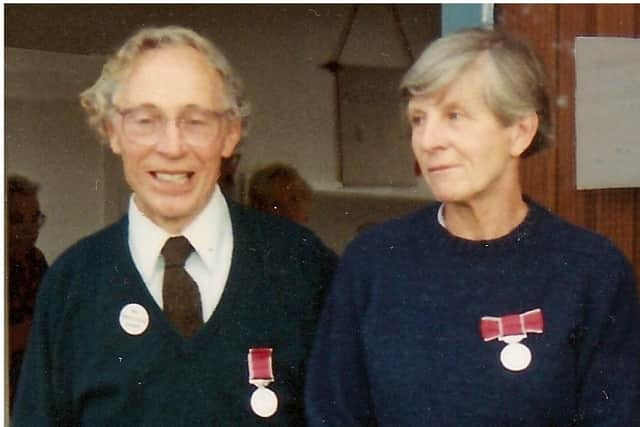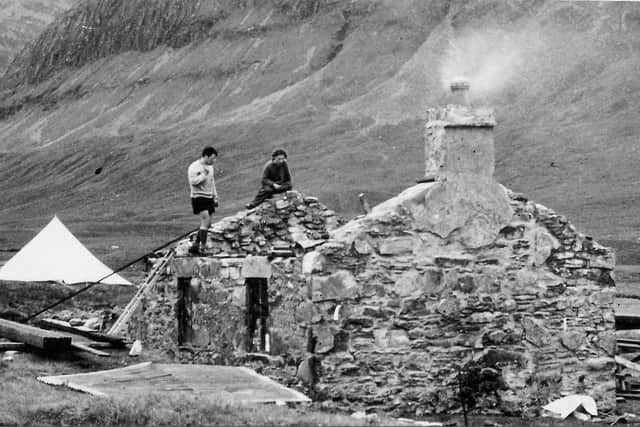Obituaries: Bernard and Betty Heath, couple dedicated to maintaining bothies
The Mountain Bothies Association maintains “simple unlocked shelters for all who love the wild and lonely places” – over 100 of them in the wildest and most dramatic of Britain’s landscapes – entirely through voluntary effort; since its founding in 1965 they have had several million overnight visitors, and saved many lives. The idea, and the initial drive to implement it, all came from one person: Bernard Heath, who has died at the age of 93. For over 50 years he formed a close partnership in this work with his wife Betty, who died last year aged 89. Their achievement was recognised by an unusual double award of British Empire Medals.
Bernard was born in 1928 in Huddersfield, the younger son of Joseph Heath, an engineers’ tool inspector, and his wife Jessie (nee Fuller). Leaving school at 16, and following National Service in the Royal Navy, he qualified as a Chartered Management Accountant and taught accountancy at technical colleges in Huddersfield and later Thurso.
Advertisement
Hide AdAdvertisement
Hide AdHis main love however was cycling – “every run was an adventure and with Bernard it always involved some riding on rough tracks”. Bernard was inspired to improve the opportunities for the post-war generation of cyclists, both locally and nationally, and so was involved in the formation first of Huddersfield Star Wheelers and then in 1955 the Rough Stuff Fellowship. For ten years his annual holidays were spent with a friend, Frank Goodwin, cycle-camping in remote corners of the highlands of Britain. They explored just about every Highland glen, pushing or carrying their bikes over high passes and fishing the lochs to supplement their food supplies. He took several trips abroad, most notably making a first cycle crossing of the interior of Iceland in 1958.


On his travels he frequently stayed in bothies – remote shepherds’ and gamekeepers’ houses that had become uninhabited between the two World Wars, and were beginning to decay. On a New Year expedition through Galloway Bernard picked up a chance remark in a visitors’ book that “something should be done to save the old bothies from ruin”. He organised a first renovation, of Tunskeen in Galloway in 1965, and then called an inaugural meeting.
Bernard’s idea was simple, and perfectly fitted to Britain’s wild places. Many countries had mountain huts, but these were usually built for that purpose and maintained by public bodies. In contrast the Mountain Bothies Association would only work on existing buildings – part of the human history of the landscape – and the work would be done entirely by volunteers: the idea being that those who use bothies should maintain them. Some doubted whether the money needed for renovations could be raised, but at that inaugural meeting Lord Alastair Elibank, who was Recreational Training Adviser for the Scouts in Scotland, said: “If you get the idea right, the money will come”; and so it has proved.
Over the next four years Bernard, despite being in a full-time job, organised work to save 15 of the remotest and best-loved bothies, from a gamekeeper’s cottage at the heart of the wildest part of the Northwest Highlands to a mine cottage on the highest hill in the Pennines. His open and enthusiastic approach to gaining support and volunteer effort won over boy scouts and upper-class estate owners alike.
Bernard’s trust in people shone through in another successful guiding principle, that the Association would not ask for any property rights; it would rely on building good relations with bothy owners, simply asking for permission to maintain a building “for the time being”. Startling evidence of the effectiveness of this approach is that all those 15 earliest renovated bothies are still maintained by the MBA, after more than 50 years.


In his work he was soon joined by Betty, in what became such a close partnership over 50 years that they were thought of almost as one person, affectionately known as B&B. Betty – born Elizabeth Sheila Taylor – came from a very different background; her father Hugh Taylor was the banker grandson of Johnnie Walker of whisky fame, and Betty was educated at Wycombe Abbey school, where she was one of its first intake when it reopened in 1946. But she was as tough as Bernard, as resourceful, and as selflessly enthusiastic.
After school Betty worked at the Agricultural Research Institute at Ayr, where a colleague introduced her to the world of climbing – and of howffs and bothies. She got to know many of the Glasgow climbers of the time, including Jock Nimlin and Sir Robert Grieve, and she went on to climb all Scotland’s 284 Munros.
Betty was introduced to Bernard at the MBA’s Inaugural Meeting in 1965 with the words “and here’s your first woman member”, and helped with the completion of the MBA’s first project at Tunskeen. Love flourished at one of the MBA’s largest projects, the rebuilding of Camban in Glen Affric in 1969, and they were married the following March.
Advertisement
Hide AdAdvertisement
Hide AdTheir very success in attracting help, particularly volunteers with professional skills, led after a time to a dilution in their role, but they continued for the rest of their long lives to supply materials, support and inspiration from the home in Thurso to which they moved on getting married. In the late 1970s Bernard gave up his teaching job so that he and Betty could start a metal recycling business and small holding, an unusual mix which they successfully ran for over 20 years. In 1991, shortly after the MBA’s 25th Anniversary, they received the unusual double recognition of both being awarded British Empire Medals.
In Thurso they became widely involved in local conservation affairs, ranging from campaigning issues to planting a mixed woodland that they later handed over to the Dunnet Forest Trust.
At the age of 74 Bernard fulfilled a long-held ambition to cycle from Land’s End to John O’Groats, spinning out the route to over 1,500 miles along byways and off-road tracks. Two years later a stroke brought a gradual slowdown to his activities. He continued working on bothy projects in his 80s, but eventually spent his last three years in a nursing home.
Betty continued very active to the end. At the age of 86 she went backpacking on her own in the wilds near Cape Wrath; and picking plums for a charity from a tree on a steep bank near her home, because, as she explained, it was too dangerous to ask anyone else to do it.
OBITUARIES
If you would like to submit an obituary (800-1000 words preferred, with jpeg image), or have a suggestion for a subject, contact [email protected]
A MESSAGE FROM THE EDITOR
Thank you for reading this article. If you haven't already, please consider supporting our trusted, fact-checked journalism by taking out a digital subscription. Click on this link for more details.
